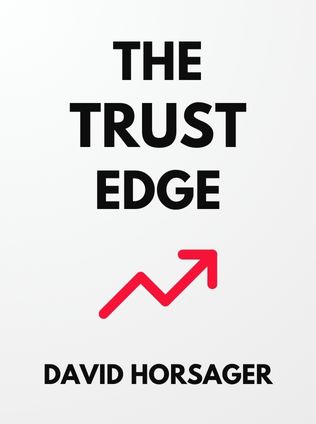
The Trust Edge
How Top Leaders Gain Faster Results, Deeper Relationships, and a Stronger Bottom Line
By David Horsager
Published 10/2012
About the Author
David Horsager, M.A., C.S.P., is a renowned business strategist, entrepreneur, and professor who focuses on the pivotal role of trust in leadership and business success. His extensive research into trust's impact on bottom-line results has led him to work with a variety of high-profile clients, including Wells Fargo, ING, and the Better Business Bureau. Horsager's expertise is distilled into his seminal work, "The Trust Edge: How Top Leaders Gain Faster Results, Deeper Relationships, and a Stronger Bottom Line."
Main Idea
"The Trust Edge" by David Horsager revolves around the fundamental idea that trust is the cornerstone of success in any organization or relationship. Horsager argues that trust, more than money, is the real currency of business and life. He introduces the Eight Pillars of Trust, which are essential for building and maintaining trust. These pillars, when implemented effectively, lead to enhanced relationships, better reputations, improved retention, increased revenue, and superior results.
Table of Contents
- The Case for Trust
- The Eight Pillars of Trust
- Transforming Trust
- Deep Trust in a Flat World
- Courageous Trust
The Case for Trust
Horsager begins by laying the groundwork for understanding why trust is indispensable. Without trust, transactions halt, influence diminishes, and leadership crumbles. Trust is defined as a confident belief in someone or something: to do what is right, to deliver what is promised, and to remain consistent. As Horsager puts it:
"Trust, not money, is the currency of business and life." - David Horsager
In a high-trust environment, people are more creative, motivated, productive, and willing to sacrifice for the team. Conversely, skepticism and suspicion lead to higher costs, reduced loyalty, and slower processes. Horsager cites John O. Whitney of Columbia Business School, who found that "Mistrust doubles the cost of doing business."
The Eight Pillars of Trust
Horsager identifies eight key pillars that form the foundation of trust. These pillars are clarity, compassion, character, competency, commitment, connection, contribution, and consistency. Each pillar plays a crucial role in building and maintaining trust within an organization or relationship.
Pillar 1: Clarity
Clarity is essential for trust. Without a clear plan, employees are confused and become ineffective. Without a clear product choice, prospects won't buy. Clarity starts with honesty and is increased when a message is heard or seen frequently. According to the Edelman Trust Barometer, people need to hear information about a company three to five times before they believe it. Clarity in vision and purpose, expectations and communications, and daily tasks is crucial.
"Few things inspire trust or hope like every member of the team working together toward a shared vision." - David Horsager
clarity in action include:
Sign up for FREE and get access to 1,400+ books summaries.
You May Also Like
The Subtle Art of Not Giving a F*ck
A Counterintuitive Approach to Living a Good Life
By Mark MansonRich Dad Poor Dad
What the Rich Teach Their Kids About Money - That the Poor and Middle Class Do Not!
By Robert T. KiyosakiHow To Win Friends and Influence People
The All-Time Classic Manual Of People Skills
By Dale CarnegieQuiet: The Power of Introverts
The Power of Introverts in a World That Can't Stop Talking
By Susan Cain



















